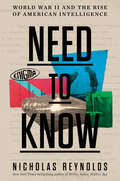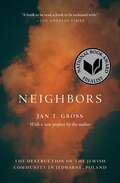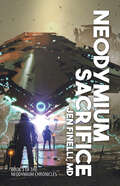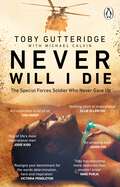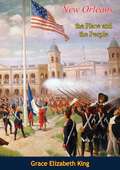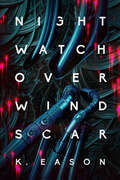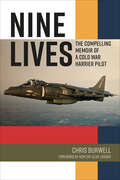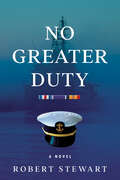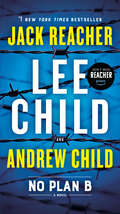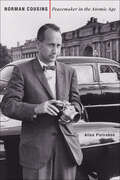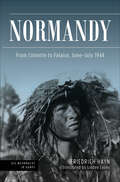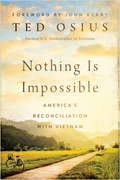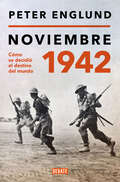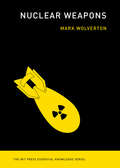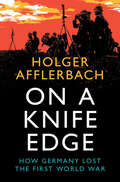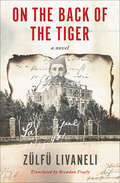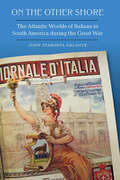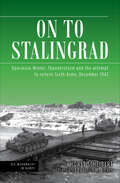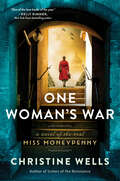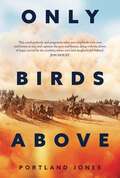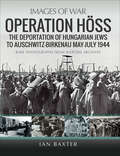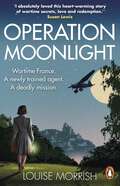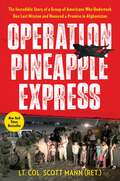- Table View
- List View
Need to Know: World War II and the Rise of American Intelligence
by Nicholas ReynoldsOne of The New Yorker's "Best Books of the Year" * A Gilder Lehrman Military History Prize Finalist"Authoritative. . . . [Reynolds's] contribution to our understanding of the rise of American intelligence is unparalleled." —Journal of Intelligence History“The most thorough and detailed history available on the origins of U.S. intelligence.” —Michael Morell, former Deputy Director and Acting Director, CIAHistorian and former CIA officer Nicholas Reynolds, the New York Times bestselling author of Writer, Sailor, Soldier, Spy, uncovers the definitive history of American intelligence during World War II, illuminating its key role in securing victory and its astonishing growth from practically nothing at the start of the war. The entire vast, modern American intelligence system—the amalgam of three-letter spy services of many stripes—can be traced back to the dire straits the world faced at the dawn of World War II. Prior to 1940, the United States had no organization to recruit spies and steal secrets or launch covert campaigns against enemies overseas and just a few codebreakers, isolated in windowless vaults. It was only through Winston Churchill’s determination to mobilize the US in the fight against Hitler that the first American spy service was born, built from scratch against the background of the Second World War.In Need to Know, Nicholas Reynolds explores the birth, infancy, and adolescence of modern American intelligence. In this first-ever look across the entirety of the war effort, Reynolds combines little-known history and gripping spy stories to analyze the origins of American codebreakers and spies as well as their contributions to Allied victory, revealing how they laid the foundation for the Cold War—and beyond.
Neighbors: The Destruction of the Jewish Community in Jedwabne, Poland
by Jan T. GrossA landmark book that changed the story of Poland’s role in the HolocaustOn July 10, 1941, in Nazi-occupied Poland, half of the town of Jedwabne brutally murdered the other half: 1,600 men, women, and children—all but seven of the town’s Jews. In this shocking and compelling classic of Holocaust history, Jan Gross reveals how Jedwabne’s Jews were murdered not by faceless Nazis but by people who knew them well—their non-Jewish Polish neighbors. A previously untold story of the complicity of non-Germans in the extermination of the Jews, Neighbors shows how people victimized by the Nazis could at the same time victimize their Jewish fellow citizens. In a new preface, Gross reflects on the book’s explosive international impact and the backlash it continues to provoke from right-wing Polish nationalists who still deny their ancestors’ role in the destruction of the Jews.
Neodymium Sacrifice (The Neodymium Chronicles)
by Jen FinelliAn &“intricately plotted&” space opera &“ups the already sky-high stakes,&” of this sci-fi series and fans &“will not be disappointed&” (Publishers Weekly). The Universe is nursing a morning-after hangover. That&’s how ex-freedom-fighter Lem Benzaran feels. Exiled after going AWOL to save her world, she lives in a changed galaxy in the aftermath of a purge that wiped entire planets clean of people like herself. A vague prophecy plagues her isolation: she&’s destined to cause the Universe&’s heat death. Jei Bereens is one of Lem&’s only contacts with her old life. Once his command team&’s golden boy, Jei&’s now under constant surveillance as a distrusted super-weapon. Worse, amidst waves of withdrawal from his lost love&’s nerve pheromone, Jei&’s struggling to break free of the childhood rival who&’s learned to use that vulnerability to trap him in his mind. That rival, Jared Diebol, now holds almost every card he needs to take full control of the forces bent on homogenizing the galaxy. Driven to desperation by Lem and Jei, Diebol&’s created a mind-control device that may finally turn Jei into the world-destroying machine he needs to end this war. If Lem tries to stop him, Diebol vows to kill her at Jei&’s hand. Between Jei&’s struggle for freedom, Lem&’s desperation to escape her destiny, and Diebol&’s hunt for control—someone has to give, and someone has to die.
Never Will I Die: The inspiring Special Forces soldier who cheated death and learned to live again
by Michael Calvin Toby GutteridgeThere's no pain, no theatrical agony. No screaming, no shouting. The kill shot is catastrophic and conclusive. I slump silently on to my knees and topple forward, head first, into the dirt. The lads have seen enough death to assume mine is instantaneous. The lights are out. That's him gone.Toby Gutteridge was only 24 when he was shot through the neck while operating behind enemy lines in Afghanistan. He survived despite not breathing for at least 20 minutes. Back in the UK, doctors recommended that his life support machine be switched off, but with the defiant spirit that would define his recovery, Toby pulled through.Now quadriplegic, capable of movement only with his head, Toby has rebuilt his life. His is an extraordinary story of survival against overwhelming odds, and of the power of the human spirit to overcome extreme adversity. Brutally honest and authentic, he builds a compelling picture of the type of person produced by the Special Forces system, and tells of how one split second changed the course of his life forever.Powerful and inspiring, Never Will I Die is a universal story about our search for purpose, and explores what extreme experience teaches us about what truly matters.
New Orleans the Place and the People
by Grace Elizabeth KingThe work presented here is a popular history of New Orleans published in 1895 and covering the entire history of the city down to that date. It is written in a vivid, discursive style.Not as well-known as some of her contemporaries—Mark Twain, George W. Cable, and Joel Chandler Harris, to name a few—author and historian Grace King (1851- 1932) was nonetheless highly praised in her own right. She garnered attention from such eminent critics as William Dean Howells, and her work frequently appeared in Harper's and Century Magazine. She published thirteen volumes of fiction, history, biography, and memoir. What contributed to King's critical acclaim, and her continued importance across time, was the panoramic view of social and historical New Orleans that she captured in her writing. She was, scholar Robert Bush argues, one of the most talented and perceptive citizens of New Orleans during the post- Civil War period. In pursuing an intellectual career, King broke with many Old South traditions. She embraced Anglo-Saxon and Creole French cultures. Much of her work is especially interesting for the way in which her view of the southern temper and cultural contribution supplemented that of other writers of the period.-Print ed.
Nightwatch over Windscar (The Weep #2)
by K. EasonSet in the universe of Rory Thorne, the second book in this sci-fi series follows unlikely allies who must discover the secrets of ancient ruins. Iari is good at killing monsters. As a templar in the Aedis, a multi-species religious organization committed to protecting the Confederation, eliminating extra-dimensional horrors is her job. But after she helped stop separatists from sabotaging the entire Confederation, she discovered a new sort of monster: the rogue-arithmancer, political kind. Promoted and sent north to the tundra of Windscar, Iari leads a team of templars to investigate ancient, subterranean ruins, which local legend claims are haunted, and which have mysterious connections to the dangerous arithmancy used by the wichu separatists. Iari isn&’t worried about ghosts. She&’s worried about surviving separatists and a fresh attempt to upend the Confederation. Included in Iari&’s team are Char, a decommissioned battle-mecha and newly-joined templar, and Gaer, ostensible ambassador and talented arithmancer. As they delve into the ruins, they find remnants of long-ago battles, bits of broken armor and mechas—which unexpectedly reanimate and attack. It seems there is still dangerous arithmancy in Windscar--but the source isn&’t who Iari expected, and they&’re far worse than the separatists….
Nine Lives: The Compelling Memoir of a Cold War Harrier Pilot
by Chris BurwellChris Burwell charts one man’s career in aviation from joining the RAF in 1969 aged 18, to having responsibility for training pilots for the world’s major airlines nearly 50 years later. After training at RAF Cranwell and RAF Valley and a tour as a flying instructor on Jet Provosts, he joined the Harrier Force, flying on front-line squadrons in the UK and Germany during the Cold War and as an instructor on the Harrier Conversion Unit. Detachments to Belize in 1977, the Falklands (twice), ejection from a Harrier GR3, introducing FLIR and NVG to the Harrier front line and operational missions in Northern Iraq are all covered in entertaining detail. After 30 years of service, the author spent 12 years with Cobham, managing their Teesside base and flying the Falcon 20 on operational training for the military and the King Air 200 on international flight calibration tasks. Finally, he spent four years in Spain with Flight Training Europe (FTE) Jerez with responsibility for the flying training of a new generation of pilots. Through his experience as a pilot, leader and manager gained over many years, his valuable insights into military and civilian flying operations are both engrossing and noteworthy. Highly recommended to readers of both disciplines.
No Greater Duty: a novel
by Robert StewartFans of "A Few Good Men" and "Saving Private Ryan" will be drawn to this powerful story of courage, integrity, and valor in uniform.Alex Kramer, a prior-enlisted marine and a midshipman at the U.S. Naval Academy, saved three gravely-wounded brothers during combat and was decorated for extraordinary valor. Now conflict confronts him after he takes unauthorized leave to prevent a suicide by a Marine whose life he had rescued under fire. Navy Lieutenant Tara Marcellus, an Academy graduate and submarine junior officer, has returned to Annapolis as a company officer. She meets the fearless midshipman who petitions Tara's sense of moral courage when senior officers recommend punishing Alex with the harshest sanction: separation.Alex's case triggers heated arguments at the Naval Academy's highest levels. He fiercely defends the code of honor he swore, and bled, to uphold; never leave a sailor or Marine behind. Tara deals with a major test of character: either take Alex's side with risks to her role, or do nothing and regret her silence. Together, the two young service members will stand up for a greater duty---for integrity---because it is honorable, despite any consequences that lie ahead for them.
No Plan B: A Jack Reacher Novel (Jack Reacher #27)
by Lee Child Andrew Child#1 NEW YORK TIMES BESTSELLER • Don&’t miss the hit streaming series Reacher! &“No Plan B is not to be missed. A perfectly plotted, fast-paced thriller, with bigger twists than ever before. It&’s no wonder Jack Reacher is everyone&’s favorite rebel hero.&”—Karin SlaughterONE OF THE BEST BOOKS OF THE YEAR: Reader&’s DigestIn Gerrardsville, Colorado, a woman dies under the wheels of a moving bus. The death is ruled a suicide. But Jack Reacher saw what really happened: A man in a gray hoodie and jeans, moving stealthily, pushed the victim to her demise—before swiftly grabbing the dead woman&’s purse and strolling away. When another homicide is ruled an accident, Reacher knows this is no coincidence. With a killer on the loose, Reacher has no time to waste to track down those responsible. But Reacher is unaware that these crimes are part of something much larger and more far-reaching: an arsonist out for revenge, a foster kid on the run, a cabal of powerful people involved in a secret conspiracy with many moving parts. There is no room for error, but they make a grave one. They don&’t consider Reacher a threat. &“There&’s too much at stake to start running from shadows.&” But Reacher isn&’t a shadow. He is flesh and blood. And relentless when it comes to making things right.For when the threat is Reacher, there is No Plan B.
Norman Cousins: Peacemaker in the Atomic Age (Johns Hopkins Nuclear History and Contemporary Affairs)
by Allen PietrobonAs the editor of the Saturday Review for more than thirty years, Norman Cousins had a powerful platform from which to help shape American public debate during the height of the Cold War. Under Cousins's leadership, the magazine was considered one of the most influential in the literary world. Cousins's progressive, nonpartisan editorials in the Review earned him the respect of the public and US government officials. But his deep impact on postwar international humanitarian aid, anti-nuclear advocacy, and Cold War diplomacy has been largely unexplored. In this book, Allen Pietrobon presents the first true biography of Norman Cousins. Cousins was much more important than we realize: he was involved in several secret citizen diplomacy missions during the height of the Cold War and, acting as a private citizen, played a major role in getting the Limited Test Ban Treaty signed. He also wrote JFK's famous 1963 American University commencement speech ("not merely peace in our time but peace for all time"). This book is a fascinating look at the outsized impact that one individual had on the course of American public debate, international humanitarianism, and the Cold War itself. This biography of the vocal anti-communist and anti-nuclear activist's public life will interest readers across the ideological spectrum.
Normandy: From Cotentin to Falaise, June–July 1944 (Die Wehrmacht im Kampf)
by Friedrich HaynA German perspective of D-Day, written by an Army Corps intelligence officer in Normandy when the Allies invaded, published in English for the first time. A unique perspective on the decisive early weeks of the invasion in 1944, written by a German Army Corps Intelligence officer stationed in Normandy at the time of the Allied invasion, who during the invasion was the department head for enemy messages processing (Ic) in the staff of the LXXXIV AK. It discusses in detail the events leading up to the creation of Falaise Pocket, described by the author as a &“tragic turning point of an entire front.&” It discusses in detail the conditions in the American landing section and explains how the German troops based there came to be defeated.Praise for Normandy &“Should be read by scholars working on the fighting between the Americans and Germans on the western side of the Normandy front.&” —Journal of Military History &“The interaction among German command is interesting as it scrambles to patch lines. The book covers battles over D-Day beaches, U.S. paratrooper drops, Cherbourg, hedgerows, Operations Cobra and Luttich, and Falaise Pocket formation and collapse.&” —Historical Miniatures Gaming Society &“[A] unique, informative, and inherently fascinating study . . . absolutely essential and core addition to personal, professional, community, college, and university library World War II history collections.&” —Midwest Book Review
Nothing is Impossible: America's Reconciliation with Vietnam
by Ted OsiusToday Vietnam is one of America’s strongest international partners, with a thriving economy and a population that welcomes American visitors. How that relationship was formed is a twenty-year story of daring diplomacy and a careful thawing of tensions between the two countries after a lengthy war that cost nearly 60,000 American and more than two million Vietnamese lives. Ted Osius, former ambassador during the Obama administration, offers a vivid account, starting in the 1990s, of the various forms of diplomacy that made this reconciliation possible. He considers the leaders who put aside past traumas to work on creating a brighter future, including senators John McCain and John Kerry, two Vietnam veterans and ideological opponents who set aside their differences for a greater cause, and Pete Peterson—the former POW who became the first U.S. ambassador to a new Vietnam. Osius also draws upon his own experiences working first-hand with various Vietnamese leaders and traveling the country on bicycle to spotlight the ordinary Vietnamese people who have helped bring about their nation’s extraordinary renaissance. With a foreword by former Secretary of State John Kerry, Nothing Is Impossible tells an inspiring story of how international diplomacy can create a better world.
Noviembre 1942: Una historia íntima del momento decisivo de la Segunda Guerra Mundial
by Peter EnglundEl académico sueco Peter Englund trenza con maestría vidas y testimonios reales en este relato coral sobre el fatídico noviembre de 1942, que cambió el rumbo de la Segunda Guerra Mundial. La intrahistoria del mes más importante de la Segunda Guerra Mundial, contada exclusivamente a partir de los diarios, las cartas y las memorias de las personas que lo vivieron.A primeros de noviembre de 1942, parecía que las potencias del Eje todavía podían ganar la Segunda guerra mundial; antes de terminar ese mes era obviamente una cuestión de tiempo que fueran derrotadas. Entremedias había pasado el-Alamein, Guadalcanal, los desembarcos aliados en el norte de África, la retirada japonesa de Nueva Guinea y el avance soviético que rodeaba al Sexto Ejército alemán en Estalingrado. Puede que hayan sido los treinta días más importantes del siglo XX. En esta innovadora y fascinante obra, el sueco Peter Englund ha concentrado un momento histórico clave en su componente fundamental: la experiencia humana. Este relato está basado solo en los textos escritos tanto por soldados como por civiles, un recurso asombroso y profundamente humano. En treinta días memorables conoceremos entre otros a un soldado de infantería soviético en Estalingrado, un piloto estadounidense en Guadalcanal, un conductor de camiones italiano en el desierto del norte de África, un partisano en los bosques de Bielorrusia, un artillero en un bombardero británico, una niña de 12 años en Shanghái, una ama de casa en Long Island, un marinero chino naufragado, un prisionero en Treblinka, una «mujer de consuelo» coreana en Mandalay, Albert Camus, Vera Brittain... así hasta cuarenta personajes.Desde la publicación del anterior libro del autor, La belleza y el dolor de la batalla, que lanzaba una mirada similar a la primera guerra mundial, no ha aparecido un libro de historia tan fascinante. La crítica ha dicho:«Para educar a la mayoría, está magistralmente construido; como ciencia para la mayoría, es probablemente único; un logro de alcance internacional. Como literatura, es un libro que da qué pensar profundamente, lo que hace que el lector mire hacia dentro, hacia su propio tiempo».Expressen «Un coro poderoso y conmovedor, y de trasfondo el propio autor siempre presente como un espléndido guía, un maestro de la polifonía y la ambigüedad».Dagens Nyheter«Es como si toda la destreza de escritura de Englund se hubiera liberado. [...] Noviembre 1942 lo convierte en uno de los autores más importantes del país, de entre todas las categorías y de todos los tiempos».Sydsvenskan «Englund demuestra cómo la guerra redobla nuestro presente, lo hace vibrar. [...] Lo que de verdad vale la pena de la epopeya Noviembre de Englundes cómo el autor se las apaña para evocar el día a día de unos sucesos extraordinarios».Svenska Dagbladet «Un recordatorio brillante, en nuestra época, de cuán destructiva es la guerra en todos los niveles».Göteborgs-Posten
Nuclear Weapons (The MIT Press Essential Knowledge series)
by Mark WolvertonA primer on nuclear weapons, from the science of fission and fusion to the pursuit of mutual assured destruction, the SALT treaties, and the Bomb in pop culture.Although the world&’s attention has shifted to drone-controlled bombing and cyberwarfare, the threat of nuclear war still exists. There are now fourteen thousand nuclear weapons in the hands of the nine declared nuclear powers. Even though the world survived the Cold War, we need to understand what it means to live with nuclear weapons. In this volume in the MIT Press Essential Knowledge series, Mark Wolverton offers a primer on nuclear weapons, from the science of fission and fusion to the pursuit of mutual assured destruction, the SALT and START agreements, and the Bomb in pop culture. Wolverton explains the basic scientific facts, offers historical perspective, and provides a nuanced view of the unique political, social, and moral dilemmas posed by nuclear weapons. He describes the birth of the Bomb in 1945 and its use against the Japanese cities of Hiroshima and Nagasaki; explains how a nuclear bomb works; recounts episodes when the world came close to waging nuclear war, including the Cuban missile crisis in 1962; discusses nuclear policy and nuclear treaties; and traces the influence of such films as On the Beach, Dr. Strangelove, and The Day After.
On Posthuman War: Computation and Military Violence
by Mike HillTracing war&’s expansion beyond the battlefield to the concept of the human being itself As military and other forms of political violence become the planetary norm, On Posthuman War traces the expansion of war beyond traditional theaters of battle. Drawing on counterinsurgency field manuals, tactical manifestos, data-driven military theory, and asymmetrical-war archives, Mike Hill delineates new &“Areas of Operation&” within a concept of the human being as not only a social and biological entity but also a technical one.Delving into three human-focused disciplines newly turned against humanity, OnPosthuman War reveals how demography, anthropology, and neuroscience have intertwined since 9/11 amid the &“Revolution in Military Affairs.&” Beginning with the author&’s personal experience training with U.S. Marine recruits at Parris Island, Hill gleans insights from realist philosophy, the new materialism, and computational theory to show how the human being, per se, has been reconstituted from neutral citizen to unwitting combatant. As evident in the call for &“bullets, beans, and data,&” whatever can be parted out, counted, and reassembled can become war materiel. Hill shows how visible and invisible wars within identity, community, and cognition shift public-sphere activities, like racial identification, group organization, and even thought itself, in the direction of war. This shift has weaponized social activities against the very notion of society. On Posthuman War delivers insights on the latest war technologies, strategies, and tactics while engaging in questions poised to overturn the foundations of modern political thought.
On a Knife Edge: How Germany Lost the First World War
by Holger AfflerbachWas the outcome of the First World War on a knife edge? In this major new account of German wartime politics and strategy Holger Afflerbach argues that the outcome of the war was actually in the balance until relatively late in the war. Using new evidence from diaries, letters and memoirs, he fundamentally revises our understanding of German strategy from the decision to go to war and the failure of the western offensive to the radicalisation of Germany's war effort under Hindenburg and Ludendorff and the ultimate collapse of the Central Powers. He uncovers the struggles in wartime Germany between supporters of peace and hardliners who wanted to fight to the finish. He suggests that Germany was not nearly as committed to all-out conquest as previous accounts argue. Numerous German peace advances could have offered the opportunity to end the war before it dragged Europe into the abyss.
On the Back of the Tiger: A Novel
by Zülfü LivaneliA literary tour-de-force, this vivid account of an infamous Ottoman sultan&’s life in exile is also a powerful indictment of the hypocrisies of the West, from the internationally bestselling author of Disquiet.Abdülhamid II ruled the Ottoman Empire for thirty-three years, from 1876 to 1909, when he was deposed following the Young Turk Revolution and sent into exile in Thessaloniki. Now, more than a century after that fateful night of April 27, Zülfü Livaneli brings to life the fascinating later days of the overthrown sultan, who precipitated the empire&’s collapse.Based on the memoirs of Atıf Hüseyin Bey, personal physician to Abdülhamid and his entourage in exile, this vibrant historical novel explores the nature of power while painting a nuanced psychological portrait of the man who oversaw progressive reforms yet became known as the &“Red Sultan&” for the Armenian massacres during his reign.
On the Other Shore: The Atlantic Worlds of Italians in South America during the Great War
by John Starosta GalanteOn the Other Shore explores the social history of Italian communities in South America and the transnational networks in which they were situated during and after World War I. From 1915 to 1921 Italy&’s conflict against Austria-Hungary and its aftermath shook Italian immigrants and their children in the metropolitan areas of Buenos Aires, Montevideo, and São Paulo. The war led portions of these communities to mobilize resources—patriotic support, young men who could enlist in the Italian army, goods like wool from Argentina and limes from Brazil, and lots of money—to support Italy in the face of &“total war.&” Yet other portions of these communities simultaneously organized a strident movement against the war, inspired especially by anarchism and revolutionary socialism. Both of these factions sought to extend their influence and ambitions into the immediate postwar period.On the Other Shore demonstrates patterns of social cohesion and division within the Italian communities of South America; reconstructs varying transatlantic and inter-American networks of interaction, exchange, and mobility in an &“Italian Atlantic&”; interrogates how authorities in Italy viewed their South American &“colonies&”; and uncovers ways that Italians in Latin America balanced and blended relationships and loyalties to their countries of residence and origin. On the Other Shore&’s position at the intersection of Latin American history, Atlantic history, and the histories of World War I and Italian immigration thereby engages with and informs each of these subject areas in distinctive ways.
On to Stalingrad: Operation Winter Thunderstorm and the Attempt to Relieve Sixth Army, December 1942 (Die Wehrmacht im Kampf)
by Horst ScheibertThe first English translation of a German account of the attempt to relieve the Nazis&’ Sixth Army at Stalingrad during World War II. In late November 1942, Soviet forces surrounded General Friedrich Paulus&’ Sixth Army in a pocket at the Russian city of Stalingrad. In response the Germans planned a relief operation, Operation Winter Thunderstorm, intended to break through the Soviet forces and open the pocket, releasing the encircled units. The 6th Panzer Division was the spearhead of the German relief force. The attack started on 12 December 1942 and was aborted on 23 December after heavy Soviet counterattacks. This failure sealed the fate of the German Sixth Army in Stalingrad. This account of the operation was first published in German in 1956, written by the well-respected military historian and retired German officer, Horst Scheibert, who was a tank commander in 6th Panzer Division during the attempt. Utilizing many excerpts from war diaries, and telegrams sent during operations, it is a unique account of the entire operation from the situation in mid-November through the two German offensives, the Soviet counteroffensive, and ongoing fighting until early January. This book includes 16 maps from the original edition and is the first English translation of this important German account.Praise for On to Stalingrad &“Rich and detailed like very few of its kind are, with a crisp writing style and critical eye for the events of the battlefield that almost makes you feel as if you were there with Sixth Panzer. On to Stalingrad is a book so compelling that it simply should not be overlooked for your personal and professional enjoyment.&” —ARMOR Magazine &“Offers a unique viewpoint from an actual veteran who is able to provide an immediate military analysis of this mostly forgotten operation of the Stalingrad campaign.&” —New York Journal of Books
One Party After Another: The Disruptive Life of Nigel Farage
by Michael CrickNigel Farage is arguably one of the most influential British politicians of the 21st century. His campaign to take the UK out of the EU began as a minority and extreme point of view, but in June 2016 it became the official policy of the nation after a divisive referendum. In Michael Crick's brilliant new biography, One Party After Another, we find out how he did it, despite never once managing to get elected to Parliament. Farage left public school at the age of 16 to go and work in the City, but in the 1990s he was drawn into politics, joining UKIP. Ironically, it was the electoral system for the European Parliament that gave him access to a platform, and he was elected an MEP in 1999. His everyman persona, combined with a natural ability as a maverick and outspoken performer on TV, ensured that he garnered plenty of media attention. His message resonated in ways that rattled the major parties - especially the Conservatives - and suddenly the UK's membership of the EU was up for debate. Controversy was never far away, with accusations of racism against the party and various scandals. But, having helped secure the referendum, Farage was largely sidelined by the successful official Brexit campaign. When Parliament struggled to find a way to leave, Farage created the Brexit Party to ensure Britain did eventually leave the EU early in 2020. Crick's compelling new study takes the reader into the heart of Farage's story, assessing his methods, uncovering remarkable hidden details and builds to an unmissable portrait of one of the most controversial characters in modern British politics.
One Woman's War: A Novel of the Real Miss Moneypenny
by Christine WellsONE OF BOOKBUB'S BEST HISTORICAL FICTION BOOKS OF THE FALLFrom the author of Sisters of the Resistance comes the story of WWII British Naval Intelligence officer Victoire Bennett, the real-life inspiration for the James Bond character Miss Moneypenny, whose international covert operation is put in jeopardy when a volatile socialite and Austrian double agent threatens to expose the mission to German High Command.World War II London: When Victoire “Paddy” Bennett first walks into the Admiralty’s Room 39, home to the Intelligence Division, all the bright and lively young woman expects is a secretarial position to the charismatic Commander Ian Fleming. But soon her job is so much more, and when Fleming proposes a daring plot to deceive the Germans about Allied invasion plans he requests the newlywed Paddy's help. She jumps at the chance to work as an agent in the field, even after the operation begins to affect her marriage. But could doing her duty for King and country come at too great a cost?Socialite Friedl Stöttinger is a beautiful Austrian double agent determined to survive in wartime England, which means working for MI-5, investigating fifth column activity among the British elite at parties and nightclubs. But Friedl has a secret—some years before, she agreed to work for German Intelligence and spy on the British.When her handler at MI-5 proposes that she work with Serbian agent, Duško Popov, Friedl falls hopelessly in love with the dashing spy. And when her intelligence work becomes fraught with danger, she must choose whether to remain loyal to the British and risk torture and execution by the Nazis, or betray thousands of men to their deaths.Soon, the lives of these two extraordinarily brave women will collide, as each travels down a road of deception and danger leading to one of the greatest battles of World War II.
Only Birds Above
by Portland JonesThis is the story of Arthur Watkins, blacksmith, who leaves his beloved young wife Helen to serve with the 10th Light Horse Battalion in the Middle East in World War I. He returns without his horse, a man forever changed by what he has seen and suffered. Years later, Arthur's children Ruth and Tom are still feeling the effects of the first war when Tom is sent by his father to work in Sumatra. Tom Watkins is there in 1942 when the Japanese invade and is taken prisoner. This is the story of two wars that divide and unite a father and son, and all the years that lie in between.
Operation Höss: The Deportation of Hungarian Jews to Auschwitz, May–July 1944 (Images of War)
by Ian BaxterOperation Höss or Aktion Höss was the codename for the mass deportation of Hungarian Jews and their murder in the gas chambers of Birkenau extermination camp. Between 14 May and 9 July 1944, 420,000 Jews were sent to Auschwitz from Hungary, or about 12,000 per day. On arrival some twenty-five percent were selected for forced labor while the remainder were immediately gassed. The name of this atrocity came from Rudolf Höss, who returned as the commandant of Auschwitz to increase the killing capacity and ensure the smooth running of the operation. The specially built railway line into Birkenau from Auschwitz made transports to the camp more efficient enabling the SS to increase the daily killing capacity. After the war, SS Adolf Eichmann, who had organized the deportations from Hungary, boasted that Operation Höss was `an achievement never matched before or since`. This shocking book tells the story of this inhuman venture from its conception and planning, and though to the bitter, tragic end.
Operation Moonlight: A compelling and emotionally moving historical fiction novel
by Louise MorrishPassion, war and deadly secrets . . .'A charming novel full of fascinating detail about the Second World War, AND a heart-warming love story. I loved every word of it!' Katie Fforde'Wonderfully moving. A book to curl up with' Fern Britton'I absolutely loved this heart-warming story' Susan Lewis'Enthralling from beginning to end' Alan Titchmarsh'Well researched and extremely moving. I really enjoyed it' Jill Mansell____________WARTIME FRANCE, 1944Trust absolutely no one.This is the only advice newly recruited SOE agent Elisabeth Shepherd is given when faced with the impossible.Her mission: to enter Nazi-occupied France and monitor the Germans' deadly long-range missiles.GUILDFORD, 2018Betty is celebrating her 100th birthday when she receives an invite from the Century Society to reminisce on the past.She remains mysteriously tight-lipped about her past, however.And then her carer, Tali, discovers a box full of maps, letters and a gun . . .____________Readers love Operation Moonlight . . .***** 'Beautifully written and researched, this was a truly compelling read, emotionally moving and with the perfect amount of jeopardy to keep me glued to the pages!'***** 'Goes beyond just another historical fiction tale of a woman in WWII to a real page-turning literary account which was a pleasure to read.'***** 'This is a wonderful book, very gripping with a slight hint of romance.'***** 'It was very well written, totally absorbing, and with a very authentic feel.'***** 'It's one that will be staying on my shelf.'
Operation Pineapple Express: The Incredible Story of a Group of Americans Who Undertook One Last Mission and Honored a Promise in Afghanistan
by Lt. Col. Scott MannINSTANT NEW YORK TIMES BESTSELLER An edge-of-your-seat thriller about a group of retired Green Berets who come together to save a former comrade—and 500 other Afghans—being targeted by the Taliban in the chaos of America&’s withdrawal from Afghanistan.In April 2021, an urgent call was placed from a Special Forces operator serving overseas. The message was clear: Get Nezam out of Afghanistan now. Nezam was part of the Afghan National Army&’s first group of American-trained commandos; he passed through Fort Bragg&’s legendary Q course and served alongside the US Special Forces for over a decade. But Afghanistan&’s government and army were on the edge of collapse, and Nezam was receiving threatening texts from the Taliban. The message reached Nezam&’s former commanding officer, retired Lt. Col. Scott Mann, who couldn&’t face the idea of losing another soldier in the long War on Terror. Immediately, he sends out an SOS to a group of Afghan vets (Navy SEALs, Green Berets, CIA officers, USAID advisors). They all answer the call for one last mission. Operating out of basements and garages, Task Force Pineapple organizes an escape route for Nezam and gets him into hiding in Taliban-controlled Kabul. After many tense days, he braves the enemy checkpoints and the crowds of thousands blocking the airport gates. He finally makes it through the wire and into the American-held airport thanks to the frantic efforts of the Pineapple express, a relentless Congressional aide, and a US embassy official. Nezam is safe, but calls are coming in from all directions requesting help for other Afghan soldiers, interpreters, and at-risk women and children. Task Force Pineapple widens its scope—and ends up rescuing 500 more Afghans from Kabul in the three chaotic days before the ISIS-K suicide bombing. Operation Pineapple Express is a thrilling, suspenseful tale of service and loyalty amidst the chaos of the US withdrawal from Afghanistan.
